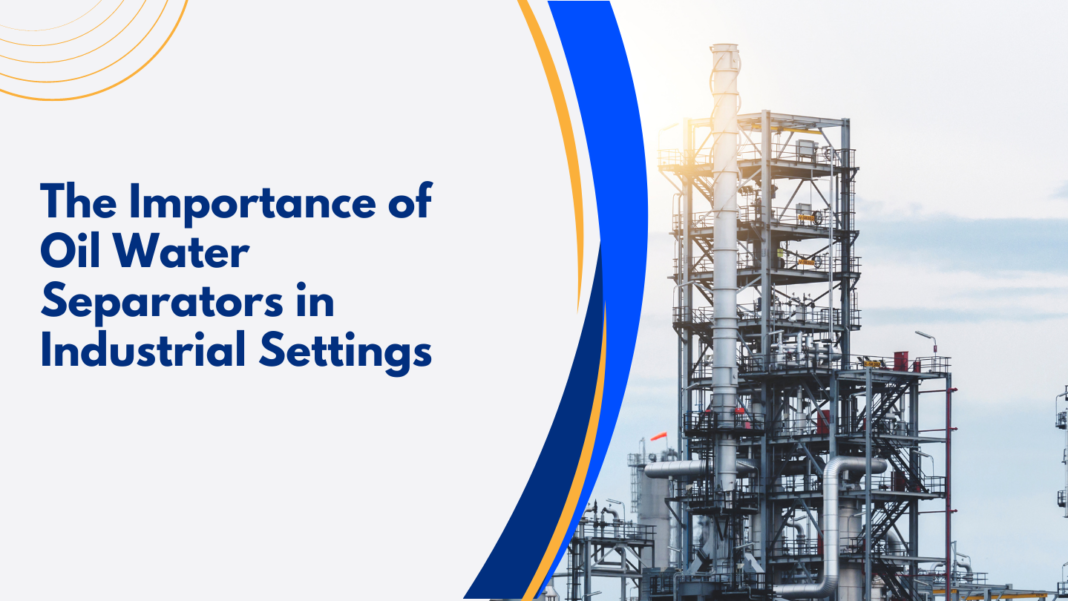The Importance of Oil Water Separators in Industrial Settings
Oil can clog pipes and harm ecological systems on a grand scale, but it can also get caught up in industrial wastewater processing equipment. That’s why it needs to be removed and collected before filtration efforts can continue. Oil water separators do this by slowing wastewater flow through baffles and a separation chamber with coalescing media. This process tumbles the wastewater over the surface, causing oil particulates to collect together and form larger, buoyant bundles.
1. Elimination of Oil and Grease
The industry generates large amounts of contaminated wastewater daily that, when left untreated, could wreak havoc on the environment. Environmental regulatory bodies have set stringent discharge norms to keep industrial sites safe and sustainable, which businesses must abide by. Oil water separators North Carolina help reduce the amount of oil in wastewater systems, reducing the risk of environmental contamination and damage.
Essentially, these machines use the principle of Stokes’ law (the physical relationship between the specific gravity of two liquids and the rising of light droplets in heavier liquid) to separate non-emulsified or free and dispersed oils from wastewater. This is accomplished through a series of stacked, inclined parallel plates that increase the surface area over which wastewater passes and coalesces small oil particulates to form larger globules.
2. Elimination of Odors
As the name suggests, an oil-water separator separates oils and grease from wastewater. It does this by using the difference in specific gravity between oil and water. Oil is lighter than water, so it naturally floats to the top of the wastewater. Oil particulates can then be skimmed from the surface.
In most countries, it is legal to discharge contaminated wastewater into the environment after first going through a proper treatment system. A business caught violating these regulations faces hefty fines and possible closure.
3. Elimination of Inflammable Materials
You may have heard the phrase “oil and water don’t mix,” but when it comes to industrial wastewater, this is more than just a quip. Removing oil from industrial wastewater is essential to recycling or sustainably disposing of that waste.
When water containing oil is discharged, it enters the ecosystem, where it causes significant damage to aquatic life and prevents soil from absorbing water, thus reducing aeration and preventing plants from getting the moisture they need to grow. An oil-water separator eliminates this risk and keeps your business compliant with environmental regulations.
Most oil water separators use an inclined plate system that creates different spaces for separating water, sludge, and oil. These plates increase the surface area of wastewater for the oil to come into contact with, allowing it to merge and be removed from the rest of the wastewater treatment process.
4. Elimination of Biological Contamination
Many businesses generate oily trade waste, which can contain various contaminants. When these oils are washed down a drain, they can disrupt water ecosystems and damage local plants and animals. They can also clog pipes and reduce available oxygen levels in waterways.
Separators ensure that these contaminants don’t end up in the environment. This helps prevent water pollution, a significant source of environmental hazards. It also prevents these contaminants from damaging the mechanisms that power municipal wastewater systems.
These devices are the minimum pre-treatment solution local water authorities require before businesses can discharge their wastewater. Car washes, workshops, service stations, and other industrial sites commonly use them to clean their wastewater before releasing it into a stormwater or sewer system.
5. Elimination of Chemical Contamination
Industrial settings produce large quantities of wastewater that contain a significant amount of oil. Oils found in these wastewater streams can clog pipes and harm ecological systems. Oil-water separators work to break down these emulsions using coalescing plates that slow the wastewater flow.
This allows the oil to separate and float to the surface while clean water discharges below. It’s essential to use quick-break detergents and degreasers to keep the system working correctly. This prevents the emulsion from becoming too thick to coalesce and ensures that the oil compartment is not overflowing into the clean water discharge. Overflows can lead to costly fines and business shutdowns for non-compliance with environmental standards.
